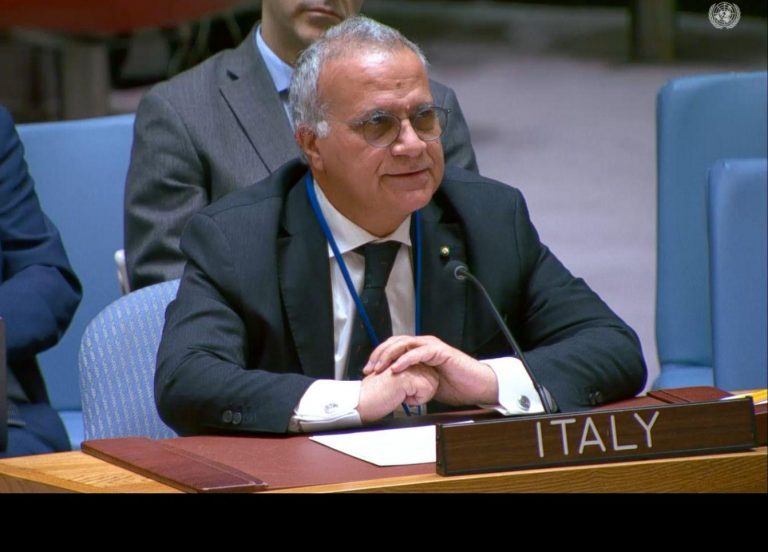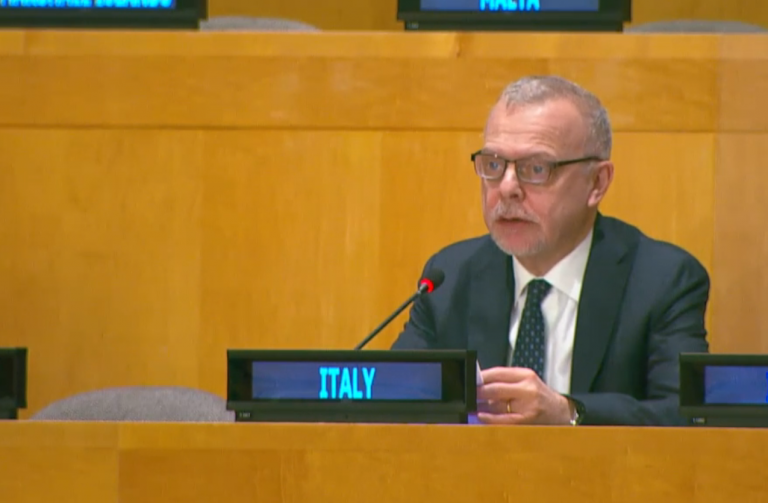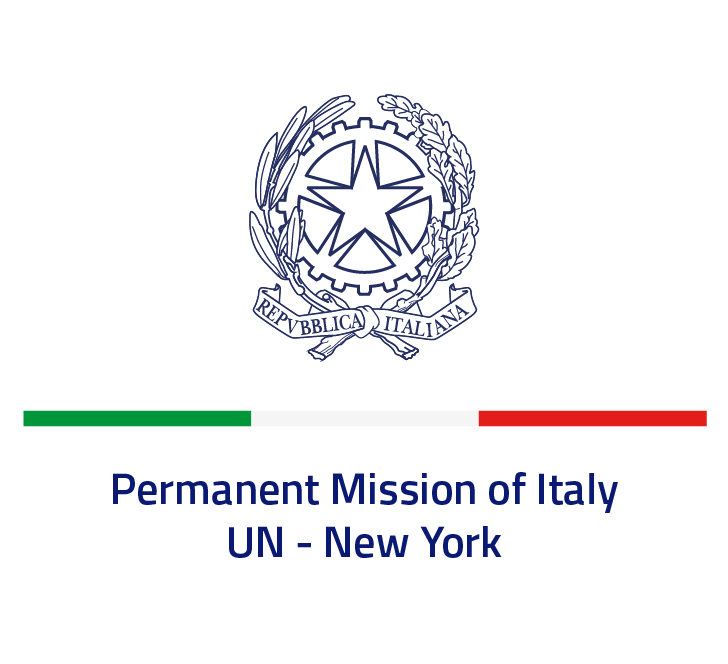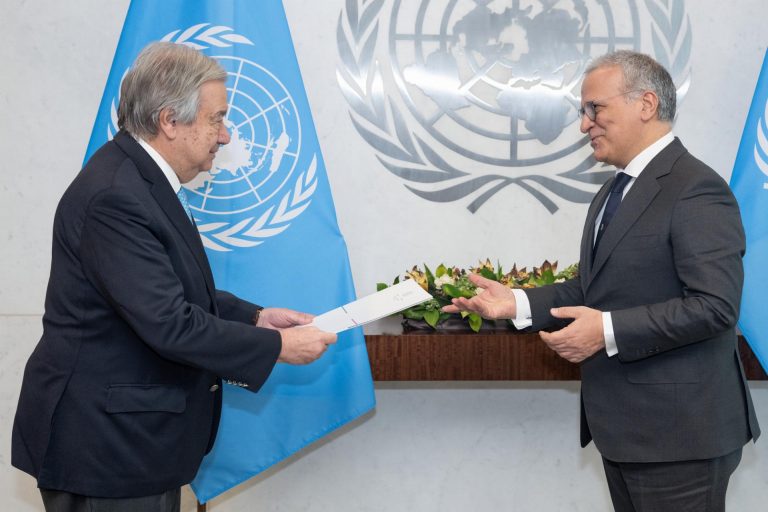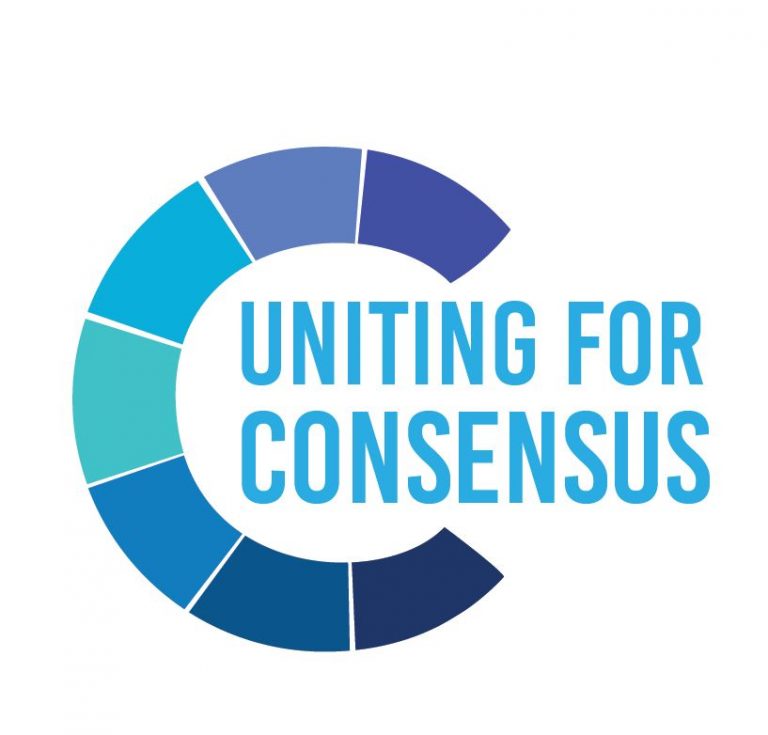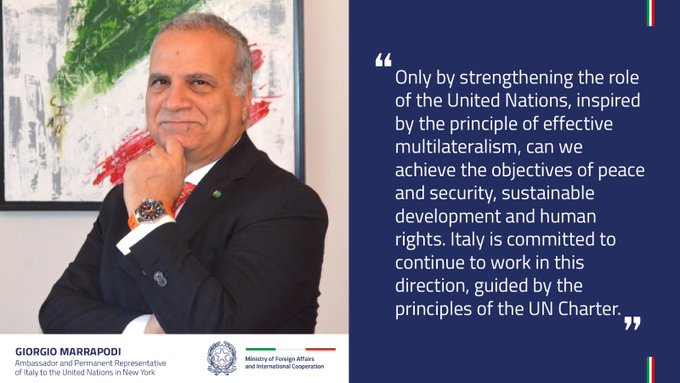Thank you, Madam President,
I salute this high assembly and have to admit how deeply moved I feel to be here. Places like these, for someone who has never spoken here, are still places of extraordinary appeal. For those instead who are used to being in rooms like this, you consider them somewhat passé. But for someone like me, who is here for the first time, I am overwhelmed by emotion to be in the same places where there is a still a sense that we can build a horizon of rights, of respect, of freedom, of peace.
I am moved to talk about the future in the place where a great Secretary-General of the United Nations, Dag Hammarkskjold, had the strength, the vision, the intuition to design a different world. For those like us who grew up with such a model, the sentence, “For all that has been: thank you. For all that is to come: yes,” which he wrote in his diaries is something more than a political program: It is an ideal definition of politics.
And yet today the future looks like a threat, the future is frightening, the future is no longer considered a promise. We want to and believe that it is possible to return to this idea of tomorrow. It is the dream of the United Nations today to go back to saving future generations from the scourge of war. But today we must have the courage to say, in looking back at the history of this organization, that the errors of the past cannot be forgotten. The year that is about to begin is a year in which we will commemorate the 20th anniversary of the events in Srebrenica, where the international institutions remained silent before one of the worst massacres, a genocide for which even today no justification can be found. This is why we need to repeat here, now, that the time has come for politics to again find a definition of future of hope.
My generation grew up hearing about the end of history, that the century that had just passed was the short century where we had already seen everything. But history has not ended. The century that we have left behind was not short, and today we have to say that it is only through a political solution that we can find a way to prevent the bloodletting that is causing so much grief in the Mediterranean, in the Middle East, in Ukraine, and in many regions of Africa.
Italy, because of its central location, has the wish, desire, the need to express a stronger role within the Mediterranean. Italy, whose gift to the world is the image of the city, of the public square, in the sense of an open gathering place, cannot be silent before the transformation all too often of the Mediterranean – which should be the heart of Europe, which should be the public square for dialogue and discussion –into a cemetery. I appear before this Assembly one year after the Italian Government launched an important operation called Mare Nostrum. Thank to this operation, I can appear before this Assembly today and say that the men and women of the Italian Coast Guard and volunteer services were able to save eighty-thousand human lives, eighty thousand people who can now go on to become doctors, musicians, workers, eighty thousand people who were torn from Mediterranean as if from a cemetery, thanks to an operation of which we can be proud, but that cannot be left to Italy alone today. What we need to say forcefully is that the intervention into the Mediterranean is a strategic intervention for the international community that cannot be left to a single force.
And in saying this, we need to say that the priority for that area today is Libya, and our friends the Libyan people, who are suffering through a season of transition that seems to be without end. We are committed to avoiding an underestimation of a hotbed in the midst of the Mediterranean that could be the point of no return in the spiral of violence and instability in that region. Italy will do its part and continue to do its part, but we must emphasize with decision and intensity in this prestigious hall, that the risk of a progressive fragmentation of Libya and the negative consequences it would trigger for the entire region of North Africa would be catastrophic for peace and stability in the entire region. We are committed to supporting a solid and stable Libya, and we will continue to work with the Special Representative of the Secretary-General to Libya through our embassy, which is still open, but we want to say with great determination that the situation in Libya must be a priority for all.
It must be a priority for those today are preparing for a discussion of the terrorist threat represented not only in the Middle East with the awareness that ISIS – as was said very forcefully yesterday – is not solely a terrorist threat in a specific region, but a risk for the entire community of the women and men who would call themselves human. We are not dealing with a form of religious expression. Religions might fuel the fires of a conflict, or provide water to soothe wounds. We believe that ISIS and the threat that it represents is not minimally connected to a religious conflict.
At the same time, we say forcefully that those of us who have had the responsibility or the fortune (allow me this provocation) to visit a refugee camp, as I did in the second half of August in Erbil, in Iraq, in the Kurdish area, will realize that before the dismayed faces of so many victims of fanaticism, we cannot remain inert. To see an international cooperator who shows you her cell phone, and on her cell phone are images of children who were executed, put up against a wall and shot, to hear stories of young women taken to barracks in the center of Mosul and forced, in silence and powerlessness, to submit to all the desires of violent terrorists, to think of what is happening to our journalist and hostages, requires from us the ability to say the words that must be said: what is happening is genocide. And in the face of this activity we know that only a unified international community can win the battle of civilization. This is why I said yesterday to President Obama that the international coalition can count on the support of Italy to eliminate the threat of ISIS and I continue to insist on the fact that the commitment of our Country in all the regions and all the areas of the region will be resolute and, I hope, decisive.
Italy has contributed and will contribute to Lebanon with our soldiers, through their commitment to support the United Nations Peace-Keeping Mission deployed in Lebanon. And I take this opportunity to express my heartfelt thanks to the women and men who from Lebanon to Afghanistan wear the uniform of our Country and make a concrete commitment to guaranteeing stability and peace. But at the same time I know, we know, that there will be no peace in the region until what a great prophet of Italian political thought, Giorgio La Pira, called the “Peace of the Children of Abraham” has ended the unsettled conflict between the Palestinians and the Israelis. We will never tire of seeking peace for Jerusalem. And the cease-fire in Gaza will be consolidated and respected only if we all recognize the two-state solution, and the right of the Palestinian people to finally have a homeland, and – as I have said in the past and wish to repeat here – recognize not only the right but also the duty to Israel to exist, for the sake of history, for the sake of memory, for the sake of the innovation, democracy, and freedom of which the Israeli people give constant proof. The entire international community must support this process and we must speak clearly in this Assembly, in which in the past someone dared to call into question the very right to existence of Israel.
It is dialogue, politics, that can prevent a return to the dialectics of the Cold War. We had thought that season was behind us, and instead the tensions on the eastern border of the Ukraine risk jeopardizing the greatest achievement of the process of European integration: a continent of peace and stability. Never before has there been such a long period of peace as the one we are experiencing in Europe. But the crisis in Ukraine places us before unexpected crises. I believe there is a connection between two fundamental principles: the right of the Ukrainian people to have the unity of their territory recognized in the face of an act of aggression that has violated its integrity. And at the same time, I hope that we can overcome tensions with the Russian Federation, which I hope can return to playing its role as a global stakeholder so needed by the international community. A great expert in politics during the Italian Renaissance, Niccolò Macchiavelli, once wrote, “To know how to recognize an opportunity in war and seize it benefits you more than anything else.” (The Art of War). Machiavelli’s words help us to see that in this moment, the Minsk Agreement is a great opportunity to end the war underway in the Ukraine, an opportunity that must be seized by both the Ukrainian people and the international community.
Dialogue and reconciliation are indispensable tools in Sudan, in Somalia, and in the Central African region. They are the strong point in our community as it faces the new emerging difficulties, starting with the challenge of the Ebola virus and its dramatic humanitarian, social and economic consequences. Italy is doing its part and will continue to do so on the basis on the leadership inspired by the Secretary-General of the United Nations, Ban Ki-moon, who I thank for the timeliness of his action. But I also wish to emphasize that political solutions are the only way, the only strategy, in a year, 2015 that we begin this year, this year of the United Nations, under the sign of tangled and difficult challenges. The challenges of a new global governance of the web, as the Brazilian president mentioned yesterday in her address, the challenge of finally making a large investment in gender equality, and stop considering it a news item when a woman assumes a leadership position. And I am proud of my government, a government that for the first time in Italian history consists of more than 50% women. And I am happy and enthusiastic to say that we will never fall short in our commitment to roles of leadership for women in countries where there is already a strong presence of women but above all in the battle to assure that young women can be free in the Countries facing the greatest difficulties and in developing Countries.
And how can I not emphasize that 2015 will be a particularly significant year for the fight against religious discrimination. Every religious minority has the right to be defended. Allow me to say something: never before have so many Christians been killed because of their faith, and never before has there been such an underestimation of one of the genuine tragedies of our times. We need, in particular, within the international community and at international fora to affirm forcefully the values of equality, respect, and tolerance, which for Italy are particularly true when we speak about the death penalty. This is why the session of the General Assembly that we are inaugurating coincides with the presentation of a new resolution for a moratorium on the application of the death penalty. It is my hope that the alliance of Country that have chosen to support the resolution will grow. And allow me to say that I am particularly moved to act as the spokesperson for Italy, a Country that has always fought at the governmental and non-governmental level to succeed in making this issue a priority. In my life I have been the mayor of a city, Florence, which was the first place in history to abolish the death penalty. Descending the step of the Palazzo Vecchio, a herald made the announcement that in that State – in the Grand Duchy – the death penalty had been abolished. Let us not add barbarism to barbarism. I ask every State to join us in this battle, a battle for civilization.
2015 is also a very important year for the Milan Expo, the Paris Conference on Climate – which we discussed two days ago – and for appointments that require a turning point, including the debate over Security Council reform. We are all convinced that the Council must be made more effective, representative, transparent, and accountable to the members of the international community. But opinions on how to achieve this objective continue to diverge. To reduce the distance between the various reform models, the Uniting for Consensus group to which my Country belongs continues to believe that the creation of new national permanent seats would compromise the achievement of this goal, and I reiterate our willingness to find compromise solutions.
Distinguished Delegates,
I believe it is truly important that all of these challenges be encapsulated in the greatest challenge that we are facing, a challenge in which we must all be on the front lines. There will be no peace, no respect, no freedom, until the international community places at the center of its strategy a great, gigantic investment into education, schools, universities, into the ability to go house to house, village to village, square to square, to say that the most powerful arm for affirming the value of peace and freedom is the arm of education, the arm of culture, is the arm of human capital, is the arm of investment into the persons, the stories, and the freedoms of individual women and men. This is why I believe that though we are living a difficult season, we are also living a season in which it is necessary, I return to the words of Dag Hammarskjold, to say yes to the future. Secretary-General Hammarkskjold once said, “We are not permitted to choose the frame of our destiny. But what we put into it is ours.” My dear colleagues. We are not permitted to choose the frame of our destiny. We are living through a season of threats and problems. Yet what we can put into it is ours. Into this frame, the frame of our destiny we can once again inspire the values of education, freedom and peace, so long as we are consistent of our history and in love with our future.
Thank you, and my best wishes for your work.







